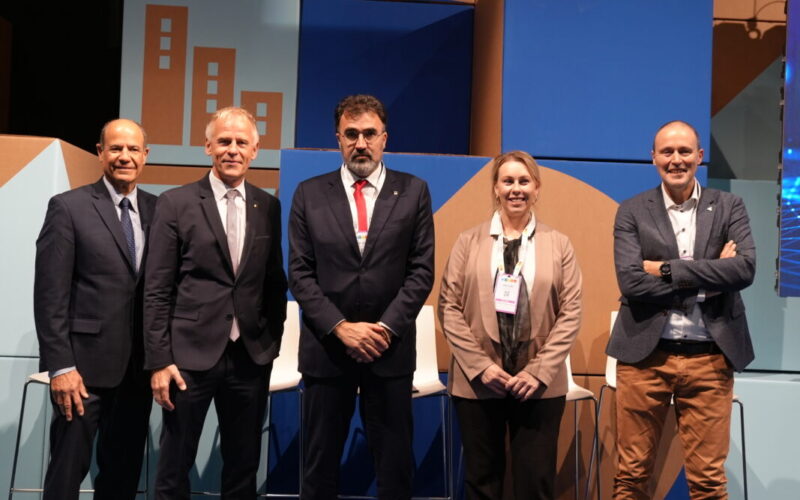Smart Ports: Piers of the Future recently concluded its fifth successful edition at the Smart City Expo World Congress (SCEWC) in Barcelona against the backdrop of Tomorrow. Blue Economy Plaza, the global summit dedicated to promoting and developing the potential of the Blue Economy, where various conferences related to the blue economy were held.
This gathering brought together port authorities from across the globe, sparking insightful conversations and generating a wealth of ideas related to innovation, collaboration, and shared insights.
The exhibition pods, strategically designed spaces for fostering synergies between startups and ports, proved to be highly productive throughout the venue.
On 7 November, Smart Ports actively participated in the main auditorium of the SCEWC, while on 8 November, the event kicked off with a warm welcome from influential figures in the maritime industry, including the Port of Antwerp-Bruges, Port of Barcelona, Port of Gothenburg, Hamburg Port Authority, and the Port of Los Angeles. The discussions underscored the significance of leading ports as hubs of innovation, serving as testing grounds for cutting-edge technologies, all while promoting trust and cooperation.
The guest list featured notable entities such as the Maritime and Port Authority of Singapore, Vancouver Fraser Port Authority, Tanger Med Port Authority, and Port Authority of New South Wales.
A prevalent theme that emerged throughout the day was the importance of collaboration over competition. The event highlighted that sharing ideas is paramount to driving innovation and sustainable development within the maritime sector.
READ: Smart Ports: Piers of the Future 2023 charts the course for sustainable maritime innovation
On the formation and control of safe UAV ecosystems in ports
Unmanned aerial vehicles (UAVs) have huge potential for ports in support of several use cases linked to safety, security and operational efficiency. Using the port as an innovation platform, port authorities are paving the way to tackle the challenges from an operational and legal perspective. The importance of a dedicated drone workgroup in chainPORT, focusing on knowledge sharing, was highlighted.
Port authorities, who are currently responsible for safety and security on land and water are perfectly positioned to extend that responsibility towards the sky, since land, water and air are all interconnected from a risk perspective.
Challenges and opportunities in cargo shipping and ports: a collaborative discussion
Panellists convened to tackle the pressing issues faced by port authorities, cargo owners, and shipping companies in the industry. Collaborative strategies were explored to find common solutions that could enhance the efficiency and sustainability of global cargo transportation networks.
Driving sustainable and intelligent maritime transport
With environmental concerns and the imperative for greater efficiency taking centre stage, the maritime industry is undergoing a transformative shift. Industry experts discussed the latest technological advancements and practices contributing to sustainable and intelligent maritime transport. They also examined the role of digitalisation, alternative fuels, and collaborative initiatives in driving change in the industry. The panel also emphasized the urgent need for regulations and the critical importance of creating a level playing field in Europe to test and implement new technologies. Ports play a pivotal role in this regard as new technologies tested can later be implemented in other urban areas to foster innovation. The Port of Singapore Authority highlighted how technology is instrumental in addressing climate change and explained their efforts to adapt technology to cope with changing sea levels. The Port Authority of Montreal discussed emissions avoided since the implementation of shore power, proving that technology can be efficiently used to save resources.
A notable participant in the discussion was the Port of Barcelona’s foundation, BCN Port Innovation. Functioning as a private foundation with support from the Port of Barcelona, in collaboration with Ackcent and Aggity, BCN Port Innovation aims to attract talent with the vision of revolutionising the maritime-port sector into a pioneering smart hub.
Port City Renaissance: Redefining Port City Landscapes through Innovative Development Models
This session delved into the dynamic world of urban development within ports, showcasing innovative models that are shaping the future of port city landscapes. The discussions explored the symbiotic relationship between port activities and urban growth, envisioning a future focused on economic prosperity and social cohesion. This was a key topic at the event, with panellists underscoring the need for efficient infrastructure that conserves energy while benefiting the local community. They also emphasized the importance of sustainability investments in the infrastructure surrounding ports, which often intersect with neighbourhoods. The overall vision is to align port growth with the well-being of the local community.
The panel also featured the participation of Busan and the Port of New South Wales, adding valuable perspectives to the discourse on the intersection of port development and urban well-being.
Innovation in Blue Economy
The role of innovation in the transformation of ports finally took centre stage. With digital transformation playing a crucial role, discussions revolved around implementing innovation in ports and bringing new solutions to the maritime industry. Cutting-edge technologies like 5G, IoT, and AI are driving this transformation, reshaping the industry and improving logistics, supply chain visibility, safety, and security measures. While there is a lot of criticism surrounding AI, the panel offered perspectives on how to implement new technology and stressed that AI should not be indiscriminately applied but rather optimised and integrated thoughtfully through effective communication and knowledge sharing.








